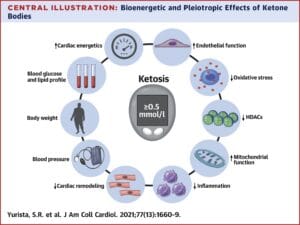Table of Contents
There is a lot of mixed science about the ketogenic diet, also known as “keto”. I’m sure you’ve come across individuals who are on the keto diet, and the first thing you ask is “wow, you look great, what are you doing?”. Some swear by it, and others say it’s backfired against them. Given the mixed reviews and mixed science, we thought it was appropriate to address the oft-asked question circulating the internet today: is keto healthy? Read on to find out and explore some interesting recipes.
What is the keto and is it healthy?
The ketogenic diet is a diet that puts the body into a state of “ketosis”, which is when your liver produced ketones for energy instead of glucose. Generally speaking, when we eat carbs, our body processes the carbohydrates for fuel, in the form of glucose. However when the body is in ketosis the liver is producing ketones for fuel instead of glucose. The ketogenic diet is made up of a diet that consists mostly of fat, some protein, and little to no carbohydrates.
Keto Nutrient Breakdown
Macronutrients include protein, fat, and carbohydrates. According to Harvard, the recommended macronutrient breakdown for the keto diet is 70-80% fat, 10-20% protein, and 5-10% fats.
The ketogenic diet is wildly popular because of it’s ability to help individuals rapidly lose weight. Despite the health benefits associated with less skeletal fat, the diet does come with some downside risks. Read on to find out and answer the question we always hear, is keto healthy?
Interested in Keto? Check out JarKitchen’s Easy Low Carb Meals!
The Good, The Bad, The Ugly
Like any good thing in life, there are downsides. Here we explore the benefits and risks of the keto diet.
Benefits of the Keto Diet
Diets don’t become popular for no reason. Stepping on the scene in late 2015, the diet gained widespread traction for it’s weight loss effects and mental clarity. Here are the top 10 benefits of Keto, if you ask most people:
Reduced Appetite
Low carb diets like keto reduce appetite, because it stabilizes your blood sugar levels. When your blood sugar levels are stable, the level and amount of insulin released by your pancreas is also stable. Insulin ignites hunger, the more stable your insulin levels are, the less hungry you will be. In sum, lower carbs = lower blood sugar level = lower insulin levels = less appetite = you lose weight.
Rapid Weight Loss
Another benefit is rapid weight loss within the first few weeks, helping you quickly achieve weight goals. For every 120-140 grams of carbohydrates, you’ll gain a pound of water weight. By eliminating carbs, not only will it stabilize your insulin levels, but you’ll immediately notice a drop in weight from reduced water being held in bodily tissues.
Abdominal Fat Loss
Most fat loss comes from the abdominal region, which is directly correlated to better health. The old adage “pinch an inch” is the best way to determine if you have any available fat to lose. The keto diet is a great way to reduce abdominal fat.
Lower Triglycerides
Triglycerides, fat in the blood, tend to drop significantly on a keto diet, which brings with it significant health benefits.
Good Cholesterol Goes Up
When on the keto diet, good cholesterol, also known as HDL, tends to go up. Typically, when we hear about cholesterol, we think it’s a bad thing, but having a high HDL has been shown to reduce bad cholesterol and keeps it from collecting in your arteries.
Bad Cholesterol Goes Down
The flip side is when HDL rises, LDL tends to go down. If you’re doing something healthy, you’ll get a double effect on cholesterol. Working out and overall eliminating saturated fats will have the same affect.
Blood Sugar Stabilizes
Unstable blood sugar levels constantly rising and falling is associated with weight gain and potentially Type 2 diabetes given how taxing this is on the pancreas. On a keto diet, blood sugar and insulin levels tend to stabilizes. In fact, some doctors claim this is the number one way to lose weight, by stabilizing blood sugar which stabilizes insulin levels.
Lower Blood Pressure
Studies have shown the keto diet helps to stabilize and lower blood pressure. Lower blood pressure is associated with reduced risks of hypertension, which if left untreated, can cause strokes.
Given all the benefits, is it any wonder why the diet is so popular?
Risk of the Keto Diet
Keto Flu
The keto diet is not without risks. The first side effect is keto flu, which is basically your body going into shock after not eating carbs. The first time I tried keto, I had a headache in the front of my head that felt like a heartbeat – a classic sympton of keto flu. Carbohydrates are a big part of our diet; so if you suddenly cut your carbs down, you will end up feeling sick, which is known as the keto flu. The keto flu lasts 48-72 hours after you begin, then disappears for most people.
Kidney Stones
Another major risk is that keto is bad for your kidneys. Without carbohydrates, and tons of animal fat and protein, you may be at risk to develop kidney stones. Kidney stones can be very painful, often said the pain is similar to going into labor to birth a child.
Poor Gut Health
The best way to keep your gut healthy is with plant fiber, like from fruits and vegetables. Without plant fiber, you may disrupt the bacteria in your gut, which helps with digestion and going to the restroom on a regular schedule. Poor gut health has also been show to cause depression, which can be ancillary side affect of the diet.
Nutrient Deficiencies
Some of the most nutrient dense foods are plants. Without sufficient plant consumption, you may end up nutritionally malnourished just eating fats and proteins.
Other side effects
Other side effects include dangerously low blood sugar, weakened bone strength and the onset of chronic diseases. While the verdict is still out on how dangerous keto is, apparently it has many health benefits.
Is the Keto Diet Safe?
At the end of the day, you have to do your research and make the decision for yourself. There is so much mixed science out there and so many people who had amazing or horrible experiences with it. Like Tim Ferris says, your body is the best lab. If something works for you, great. You’re in the best position to decide. If you want to try it for yourself and see how you feel, be sure to check in regularly with your doctor to make sure everything is fine. Let’s dive in on whether keto is good for certain organs, like your heart and liver.
Is Keto Heart Healthy?
A recent study published by the Journal of the American College of Cardiology found that ketone bodies can help protect the heart in patients with heart disease.
According to the study, a keto diet can reduce inflammation with the lowering of oxidative stress and improvement of mitochondrial functioning. The study was so promising, that the authors suggest some heart patients can take “exogenous” or external ketones as an alternative to the diet, to increase ketones in the blood without the pressures of dieting. Although the study is promising, the authors note that there has yet to be a study determining the long-term effects of the keto diet, which is unknown. Other studies show the keto diet is good for fatty liver.
Is Keto Good for Fatty Liver?
A recent study suggests the keto diet is good for treating non-alcoholic fatty liver disease (NAFLD). NAFLD is the presence of too much fat in the liver. Historically fatty liver was only seen in patients who consumed a lot of alcohol, but due to modern day diets, many are ending up with fatty livers due to diet, hence the name non-alcholic fatty liver disease. The study showed that the presence of ketone’s produced by the liver can help reduce liver fat, decrease insulin levels, reverse the disease process, suppress appetite, and promote weight loss.
Is Keto Dieting Healthy?
As mentioned above, your body is the best laboratory. It’s up to you to try it out and see what happens. Before you do anything, it’s best to consult with your doctor.
*Medical disclaimer: nothing int his article should be construed as medical advice. Rather, this is just an informative article referencing medical studies and journals. Please be sure to do your research and consult with a medical doctor before taking any major health action.

This is Berk from the JarKitchen Team. I am a Mechatronics Engineer and I like cooking in my spare time. By bringing my engineering background into the business, product reviews are a specialty for me. During my travels across Europe, I have learned/tested many recipes and now I plan to bring them to you here!







